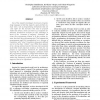Free Online Productivity Tools
i2Speak
i2Symbol
i2OCR
iTex2Img
iWeb2Print
iWeb2Shot
i2Type
iPdf2Split
iPdf2Merge
i2Bopomofo
i2Arabic
i2Style
i2Image
i2PDF
iLatex2Rtf
Sci2ools
109
click to vote
VL
2003
IEEE
2003
IEEE
End-user programming as translation: an experimental framework and study
One of the reputed advantages of end-user programming languages is that they support a given problem doh a set of programming abstractions that are “just right” for the end-users who need to program within that domain. Green and Petre’s [1] Cognitive Dimensions Framework accounts for this advantage in terms of the “closeness of mapping” dimension: the closer the programming domain is to the problem domain, the easier the programming task. This suggests that programming might be conceptualized as a process of translation, with “close” translations being more efficient and error-free than “distant” ones. While there appears to be a strong intuitive basis for this view, there presently exists little direct empirical evidence. To that end, we present an experimental framework for systematically exploring the “closeness of mapping” dimension within the programming domain of college-level textbook algorithms and data structures. A pilot study we conducted within that f...
Related Content
| Added | 05 Jul 2010 |
| Updated | 05 Jul 2010 |
| Type | Conference |
| Year | 2003 |
| Where | VL |
| Authors | Christopher D. Hundhausen, Ravikiran Vatrapu, Joshua Wingstrom |
Comments (0)

